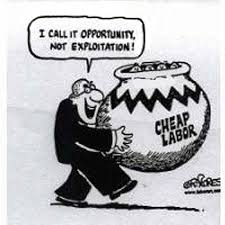
记忆方法
为了记住单词“exploitation”,可以采用以下简单记忆方法:
联想一个场景:想象一家公司正在过度开采自然资源,造成了环境的破坏和社会的不公。这种“过度使用或开发”(exploitation)的行为在脑海中留下深刻印象,从而帮助记忆这个单词。
联想一个场景:想象一家公司正在过度开采自然资源,造成了环境的破坏和社会的不公。这种“过度使用或开发”(exploitation)的行为在脑海中留下深刻印象,从而帮助记忆这个单词。
以上内容由AI生成, 仅供参考和借鉴
中文词源
exploitation 开发,剥削
来自exploit, 剥削,利用。
英语词源
- exploitation (n.)
- 1803, "productive working" of something, a positive word among those who used it first, though regarded as a Gallicism, from French exploitation, noun of action from exploiter (see exploit (v.)). Bad sense developed 1830s-50s, in part from influence of French socialist writings (especially Saint Simon), also perhaps influenced by use of the word in U.S. anti-slavery writing; and exploitation was hurled in insult at activities it once had crowned as praise.
It follows from this science [conceived by Saint Simon] that the tendency of the human race is from a state of antagonism to that of an universal peaceful association -- from the dominating influence of the military spirit to that of the industriel one; from what they call l'exploitation de l'homme par l'homme to the exploitation of the globe by industry. ["Quarterly Review," April & July 1831]
权威例句
- 1. Mr Mendes was leading a campaign to save Brazil's rainforest from exploitation.
- 门德斯先生正领导一场运动,以拯救遭到乱砍滥伐的巴西热带雨林。
- 2. Almost without exception these women fall victim to exploitation.
- 这些女性几乎无一例外都受到了盘剥。
- 3. I think their crime is a blacker one than mere exploitation.
- 我想他们的罪行比单纯的剥削更残忍。
- 4. The developed nations have all benefited from their imperialist exploitation.
- 发达国家全都从他们的帝国主义剥削中获益。
- 5. The islanders endured centuries of exploitation.
- 那个岛上的居民忍受了数个世纪的剥削。